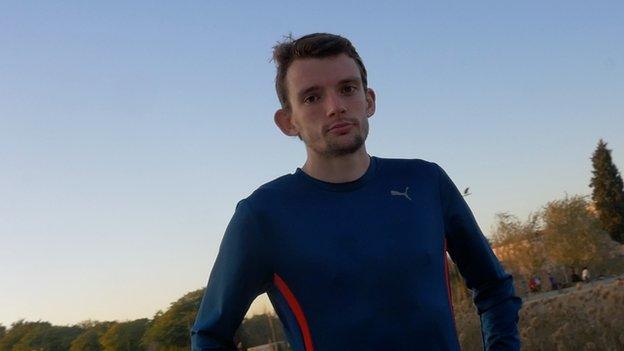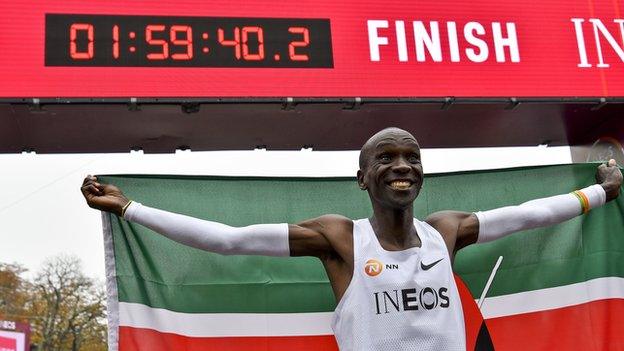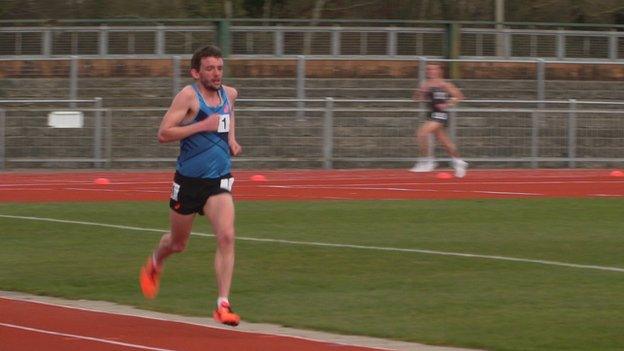Dewi Griffiths: New shoe technology like 'free time' in races
- Published
How will controversial shoe technology affect the Olympic marathon trials?
Advancements in running shoe technology are like being given 'free time' in races, according to Welsh marathon runner and Olympic hopeful Dewi Griffiths.
A new wave of high-tech shoes have coincided with a number of world records being set in endurance races.
Critics argue it gives the runner an unfair advantage, others have praised the revolutionary technology.
"It's free time in many ways," Griffiths told BBC Sport Wales.
"They make that much of a difference."
Griffiths will compete in Friday's Olympic Marathon Trial in Kew Gardens, London.

Griffiths ran 2:09:49 in his first marathon in 2017 but spent most of 2019 suffering from a 'mysterious illness'
The 29-year-old ran 2:09:49 at his debut marathon in Frankfurt in 2017 but believes the current shoes - which began with Nike's Vaporflys - completely change what times are achievable.
"I look back to my run in Frankfurt and to the day I die I will always wonder if I had the shoes that day, what would I have run?
"The way I look at it is I don't need to be in the same shape to run the same time. It's funny to say that but that's the reality of it these days."
Nike first released its Vaporflys in 2016. They introduced an ultralight springy foam combined with a carbon plate that was designed to improve efficiency.
The debate over the technology used came to the fore in 2019 when Eliud Kipchoge became the first person to run a marathon in under two hours, albeit with a team of pacemakers that meant the record was not officially recognised.
World Athletics later banned the 'Alphafly' prototype shoes Kipchoge wore that day and tightened regulations around shoe technology.
But with Nike's Vaporflys still allowed to be worn in races, it sparked a race amongst rival brands to develop similar technology.

Eliud Kipchoge wore a pair of prototype shoes with the new technology when he ran a sub-two-hour marathon in 2019.
Griffiths believes road running is now 'a level playing field again' with athletes having access to the technology across a range of brands.
But the Welshman believes the British Athletics Olympic men's marathon qualifying standard of 2:11:30 could be achieved by several runners in Friday's trial.
"The shoes make a 2'12/2'13 guy run a 2'11 time," he believes.
"You go back a couple of years, when they set the standard, 2:11:30 was probably the quickest it's been in many years, if not the quickest it's ever been, to make the Olympics as a GB athlete.
"But I wouldn't be surprised if a few of us go under it on the day purely because of the shoes.
"Obviously we're all running well, otherwise you can't run that time, but the shoes obviously add that bit of free time."
To be selected for the Tokyo Olympics an athlete must not only achieve the time but also finish in the top two in the trials.
Scottish marathon record holder Callum Hawkins has already been selected for the Games.
Griffiths is yet to run a marathon in shoes boasting the new technology.
But he feels the gains athletes get from training in them is also an advantage.
"I don't think that side of it is talked about as much," he continues. "The benefit you get in training and the recovery time makes a huge difference.
"It's a double-edged sword - you get the benefits in racing and the benefits in training. That's part of the reason why [race] times recently have plummeted.
"They improve your efficiency, more than anything," he continues. "Instead of hitting the wall at 20 miles, you now might hit it at 22, 23 miles.
"Running three miles tired is totally different to running five or six miles tired. I think that's where you're getting the big differences."
Back after a 'mystery illness'
Yet Griffiths acknowledges no shoe will make up for a lack of training.
He spent the majority of 2019 suffering from a 'mysterious illness' which left him fatigued and unable to walk that far, let alone train for a marathon.

Welshman Dewi Griffiths is hoping to qualify for his first Olympic Games at Friday's marathon trials in Kew Gardens, London.
It went on for so long he even questioned whether his body would ever be 'normal' again, as well as whether he would ever run competitively.
But the coronavirus pandemic gave him time to adapt his training and build his fitness up again.
Only the sheep and cows on his family farm in Carmarthenshire would interrupt the most consistent run of training he has managed in years.
He is now potentially one race away from a first Olympic Games.
"As an athlete this is what you dream of as a kid," he says.
"This is why you get into the sport - to try to be as quick as you can. Then when you start getting ambitious you think 'can I be an Olympian?'.
"Regardless of what happens on the day in Japan, being an Olympian is something no one can take away from you."
Griffiths has negotiated a break from lambing for the days preceding the trials. He jokes that he hopes to be able to rest the following weekend - but it may be a case of 'active recovery' if his help is needed again.
But for now, with the right shoes on his feet and right training behind him, securing an Olympic spot in Friday's trials is the only thing on his mind.